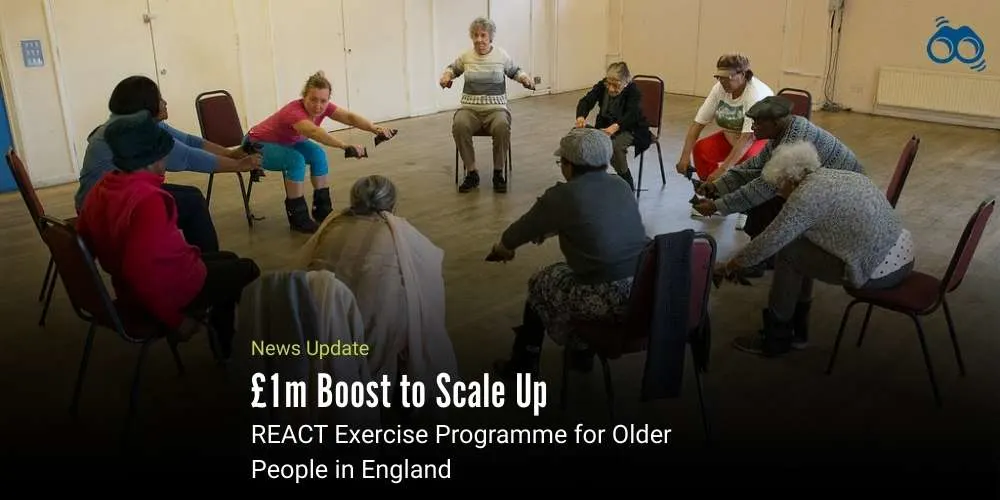REACT Programme to Improve Mobility and Independence Among Older Adults in England
UK Universities and Vivensa Foundation Partner to Deliver REACT for Healthy Ageing
As England’s population ages, supporting older adults to maintain independence and well-being has become increasingly urgent. According to the State of Ageing 2025 report by the Centre for Ageing Better, nearly one in five people in England, around 11 million, are aged 65 and over, with numbers expected to rise. Many face health inequalities, financial insecurity, and limited mobility, particularly those living alone or in disadvantaged areas.
Older people’s income is primarily drawn from the state pension, which provides over half of the total income for single pensioners and more than a third for couples. Occupational pensions and savings offer additional support, though access varies. Around 17% of pensioners live in relative poverty, with the highest rates among those aged 85 and above. Moreover, over 2.8 million people aged 50 and over provide unpaid care, while many others rely on support due to disability or isolation.
In response, initiatives like REACT (REtirement in ACTion) are vital. Designed to improve mobility and support independent living, REACT is a group-based exercise programme now set to expand across North Central London and Bristol, North Somerset and South Gloucestershire, thanks to over £1 million in funding from the Vivensa Foundation. The Vivensa Foundation is a UK-based charity focused on advancing science and social innovation for healthy ageing. As a member of the Association of Medical Research Charities (AMRC), it funds research and community programmes that address inequality and promote ageing well. Its strategic approach encourages collaboration across health, housing, and social care systems.
A team from the Universities of Birmingham and Bath will work with local Integrated Care Boards, voluntary organisations such as Age UK Bristol, and older people’s groups to deliver the expanded programme. Backed by a major clinical trial funded by the National Institute for Health Research (NIHR), REACT has already demonstrated long-term improvements in physical function and reductions in health and social care costs. Professor Afroditi Stathi, lead researcher from the University of Birmingham, noted that one in three older adults develops severe mobility limitations, which affect health, independence, and life expectancy. She emphasised that REACT had shown these declines could be slowed or reversed, and that the new study aims to bridge the gap between research and routine delivery.
The expanded programme will involve at least 750 older adults with mobility limitations. It will test regional delivery models, inclusive recruitment, cost-effectiveness, health outcomes, and funding strategies, while identifying barriers to implementation. Professor Stathi also highlighted REACT’s success in reaching disadvantaged and ethnically diverse communities during its earlier rollout in Bristol. Susan Kay, Chief Executive of the Vivensa Foundation, stated that while strong evidence exists for effective interventions, there remains a gap in supporting their large-scale adoption. She expressed the Foundation’s commitment to learning and sharing how such programmes can be implemented successfully. This expansion marks a critical step towards making evidence-based support for older adults a routine part of community health across the UK.
Editor’s Note:
As England’s ageing population grows, the REACT (REtirement in ACTion) programme offers a timely and evidence-based response to one of the country’s most pressing public health challenges. Designed to improve mobility and support independent living, REACT has already demonstrated long-term benefits through clinical trials, including improved physical function and reduced health and social care costs. Its expansion, funded by the Vivensa Foundation, will reach at least 750 older adults across North Central London and the Bristol region, helping to bridge the gap between research and routine delivery. Globally, several countries are leading the way in elderly care. Norway tops international rankings with universal pension coverage, strong financial security, and community-based support for older adults. Sweden offers high-quality home and residential care funded through municipal taxes, with a strong emphasis on dignity and independence. Japan, facing one of the world’s most rapidly ageing populations, has pioeered technological solutions such as robotic caregivers and telehealth services, alongside a cultural commitment to active ageing. Canada provides universal healthcare and a wide range of assisted living options, supported by generous pension schemes and disability benefits. Effective elderly care demands funding, infrastructure, and a commitment to inclusion, innovation, and long-term planning. England’s REACT programme exemplifies this through its community-focused delivery, inclusive recruitment, and ambition to establish a national model for scaled support. It serves as a valuable blueprint for other nations, demonstrating how robust research can be translated into practical, accessible interventions.
Skoobuzz highlights REACT as an evidence-based program that empowers older adults to live independently and with dignity, addressing the global challenges of an ageing population.














0 Comments (Please Login To Continue)